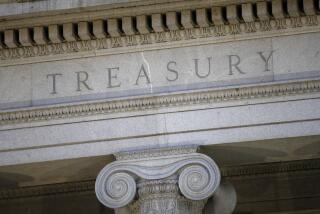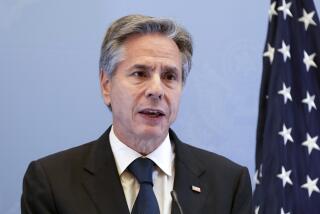Money Trail a Long and Winding Road
- Share via
WASHINGTON — It’s the other half of the war on terrorism, the side where dollar signs speak louder than smart bombs.
As U.S. officials prepare for possible military action, they are also assembling an arsenal of economic weapons designed to enlist other governments in the campaign to root out terrorist cells and to choke off the funds that keep them alive.
The United States is dangling the prospect of financial aid and trade concessions for nations that cooperate--and economic sanctions and a new crackdown on terrorist fund-raising and money-laundering for those that don’t.
On Wednesday, the Treasury and Justice departments released a report on a revised national strategy for combating money-laundering, and efforts to stamp out schemes that finance terrorism.
The Treasury Department is trying to understand, infiltrate and disrupt the multinational financial networks used by followers of Osama bin Laden and other known and suspected terrorists.
“We’re going to be following the trail, the money trail, wherever it leads,” Treasury undersecretary Jimmy Gurule said.
The initiatives won’t be lauded by everyone. Attempts to seal off Afghanistan’s already shuttered economy are likely to increase suffering in one of the world’s poorest nations, officials said.
And past efforts to sever the financial lifelines of terrorist organizations have proven generally ineffective because the money flows are difficult to detect. More than that, a successful crackdown requires the cooperation of governments that are not among America’s staunchest supporters.
“To say that we’ll freeze Osama bin Laden’s assets is very nice, but you’ve got to know where they are,” said Jeffrey Schott, senior fellow at the Institute for International Economics, a Washington-based think tank.
Administration officials and nongovernmental analysts say the economic weapons fall into two broad categories: carrots and sticks directed at other governments, and search-and-destroy missions aimed at the terrorists themselves.
Perhaps no country has more to gain than Pakistan, a potential staging area for any military assaults on Afghanistan, where Bin Laden is believed to operate several terrorist training camps.
Pakistan’s finance minister, Shaukat Aziz, has said he expects his country’s participation to yield important economic benefits: expanded access to overseas markets, additional financial aid and help with restructuring its crushing foreign debt.
In addition, the United States may be willing to ease trade restrictions imposed on Pakistan and India in an effort to deter the two countries from engaging in a nuclear arms race.
The flip side is the possible imposition of new sanctions against countries that refuse to join the U.S.-led campaign. In the case of Afghanistan, there’s almost nothing left to cut off, but other governments might be reluctant to risk an embargo.
“We trade with countries all around the world,” Commerce Secretary Don Evans said in an interview with CNN. “If they don’t want to cooperate and don’t want to be on our side, there are things and measures that we can take, sanctions or other kind of barriers to our markets here.”
Several foreign policy experts cautioned that sanctions could prove counterproductive.
“I think the international community has gotten fed up with the United States imposing sanctions on governments and regimes that it does not like,” said a former senior State Department official who requested anonymity. “It is far preferable to find common areas of cooperation and agreement.”
So far, he added, the administration appears to be pursuing the positive approach.
The other form of economic warfare is the global sleuthing that the administration’s new terrorist tracking center is designed to conduct.
Gurule, the Treasury undersecretary, said the center had begun working up “financial profiles” of some of the suspects in last week’s attacks to determine where their funding came from.
One possibility, he said, is a direct link to ostensibly charitable foundations that may be diverting a portion of their receipts to terrorist groups.
It could be a long and winding road. According to testimony in the trial of a suspect linked to the 1998 bombings of two U.S. embassies in Africa, Bin Laden presides over a multinational business conglomerate as well as a global terrorist network. One witness said his holdings included firms involved in construction, agriculture, import-export and currency exchange. Money generated by the businesses was deposited in banks in Sudan, Hong Kong, Malaysia and London, the witness said.
Gurule said the Treasury and Justice departments were working to draft legislation that would strengthen their ability to combat money laundering, including authorizing the Internal Revenue Service to open its files to counter-terrorism investigators.
Even if the multinational campaign succeeds where past crackdowns have failed, it is unlikely to eradicate terrorism, experts said. The objective, they said, is containment.
“We’re never going to fully get rid of them,” Brookings Institution scholar James Steinberg said at a forum last Friday. “But if they have to move around a lot, they’re less effective. If they have to scramble for money, they’re less effective. If they have to keep changing the way they communicate . . . they’re less effective. That’s going to be our goal: disrupt, disrupt, disrupt, dismember.”
More to Read
Sign up for Essential California
The most important California stories and recommendations in your inbox every morning.
You may occasionally receive promotional content from the Los Angeles Times.













